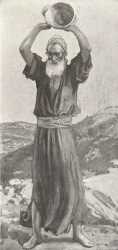Jeremiah
"Exalted." One of the "greater prophets" of the Old Testament, son of Hilkiah, a priest of Anathoth.1 He was called to the prophetical office when still young,2 in the thirteenth year of Josiah (ca. 626 BCE). He left his native place, and went to reside in Jerusalem, where he assisted Josiah in his work of reformation.3 The death of this pious king was bewailed by the prophet as a national calamity.4
During the three years of the reign of Jehoahaz we find no reference to Jeremiah, but in the beginning of the reign of Jehoiakim the enmity of the people against him broke out in bitter persecution, and he was placed apparently under restrain.5 In the fourth year of Jehoiakim he was commanded to write the predictions given to him, and to read them to the people on the fast-day. This was done by Baruch his servant in his stead, and produced much public excitement. The roll was read to the king. In his recklessness he seized the roll, and cut it to pieces, and cast it into the fire, and ordered both Baruch and Jeremiah to be apprehended. Jeremiah procured another roll, and wrote in it the words of the roll the king had destroyed, and "many like words" besides.6
He remained in Jerusalem, uttering from time to time his words of warning, but without effect. He was there when Nebuchadnezzar II besieged the city.7 The rumor of the approach of the Egyptians to aid the Jews in this crisis induced the Chaldeans to withdraw and return to their own land. This, however, was only for a time. The prophet, in answer to his prayer, received a message from God announcing that the Chaldeans would come again and take the city, and burn it with fire.8 The princes, in their anger at such a message by Jeremiah, cast him into prison.9 He was still in confinement when the city was taken (587 BCE). The Chaldeans released him, and showed him great kindness, allowing him to choose the place of his residence. He accordingly went to Mizpah with Gedaliah, who had been made governor of Judea. Johanan succeeded Gedaliah, and refusing to listen to Jeremiah's counsels, went down into Egypt, taking Jeremiah and Baruch with him.10 There probably the prophet spent the remainder of his life, in vain seeking still to turn the people to the Lord, from whom they had so long revolted.11 He lived till the reign of Amel-Marduk, son of Nebuchadnezzar II, and must have been about ninety years of age at his death. We have no authentic record of his death. He may have died at Tahpanhes, or, according to a tradition, may have gone to Babylon with the army of Nebuchadnezzar II; but of this there is nothing certain.
The Book of Jeremiah consists of twenty-three separate and independent sections, arranged in five books.
- The introduction, ch. 1.
- Reproofs of the sins of the Jews, consisting of seven sections, (1.) ch. 2; (2.) ch. 3-6; (3.) ch. 7-10; (4.) ch. 11-13; (5.) ch. 14-17:18; (6.) ch. 17:19-ch. 20; (7.) ch. 21-24.
- A general review of all nations, in two sections, (1.) ch. 46-49; (2.) ch. 25; with an historical appendix of three sections, (1.) ch. 26; (2.) ch. 27; (3.) ch. 28, 29.
- Two sections picturing the hopes of better times, (1.) ch. 30, 31; (2.) ch. 32, 33; to which is added an historical appendix in three sections, (1.) ch. 34:1-7; (2.) ch. 34:8-22; (3.) ch. 35.
- The conclusion, in two sections, (1.) ch. 36; (2.) ch. 45.
In Egypt, after an interval, Jeremiah is supposed to have added three sections, viz., ch. 37-39; 40-43; and 44. The principal Messianic prophecies are found in 23:1-8; 31:31-40; and 33:14-26.
Jeremiah's prophecies are noted for the frequent repetitions found in them of the same words and phrases and imagery. They cover the period of about 30 years. They are not recorded in the order of time.
In Islam he is called Armya.
❧
References
Notes
Source
- Easton, M.G. (1897). Easton's Bible Dictionary. New York: Harper & Brothers.
This article incorporates text from Easton’s Bible Dictionary (1897) by M.G. Easton, which is in the public domain.
